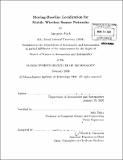Moving-baseline localization for mobile wireless sensor networks
Author(s)
Park, Jun-geun
DownloadFull printable version (19.88Mb)
Other Contributors
Massachusetts Institute of Technology. Dept. of Aeronautics and Astronautics.
Advisor
Seth Teller.
Terms of use
Metadata
Show full item recordAbstract
The moving-baseline localization (MBL) problem arises when a group of nodes moves through an environment in which no external coordinate reference is available. When group members cannot see or hear one another directly, each node must employ local sensing and inter-device communication to infer the spatial relationship and motion of all other nodes with respect to itself. We consider a setting in which nodes move with piecewise-linear velocities in the plane, and any node can exchange noisy range estimates with certain sufficiently nearby nodes. We develop a distributed solution to the MBL problem in the plane, in which each node performs robust hyperbola fitting, trilateration with velocity constraints, and subgraph alignment to arrive at a globally consistent view of the network expressed in its own "rest frame." Changes in any node's motion cause deviations between observed and predicted ranges at nearby nodes, triggering revision of the trajectory estimates computed by all nodes. We implement and analyze our algorithm in a simulation informed by the characteristics of a commercially available ultra-wideband (UWB) radio, and show that recovering node trajectories, rather than just locations, requires substantially less computation at each node. Finally, we quantify the minimum ranging rate and local network density required for the method's successful operation.
Description
Thesis (S.M.)--Massachusetts Institute of Technology, Dept. of Aeronautics and Astronautics, 2009. Includes bibliographical references (leaves 93-98).
Date issued
2009Department
Massachusetts Institute of Technology. Department of Aeronautics and AstronauticsPublisher
Massachusetts Institute of Technology
Keywords
Aeronautics and Astronautics.